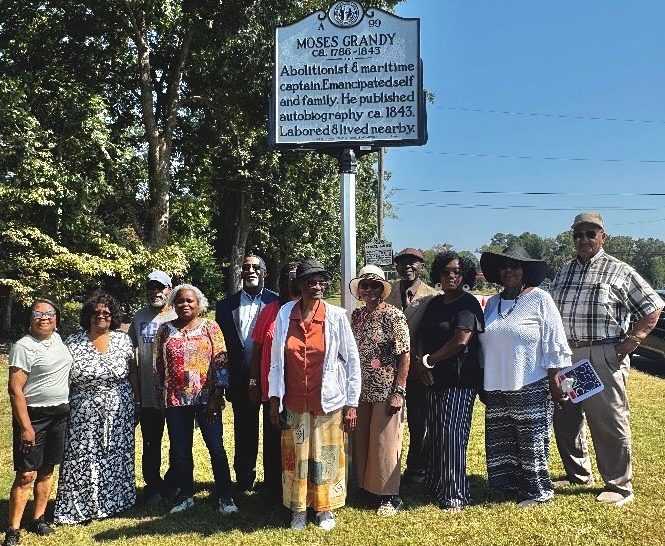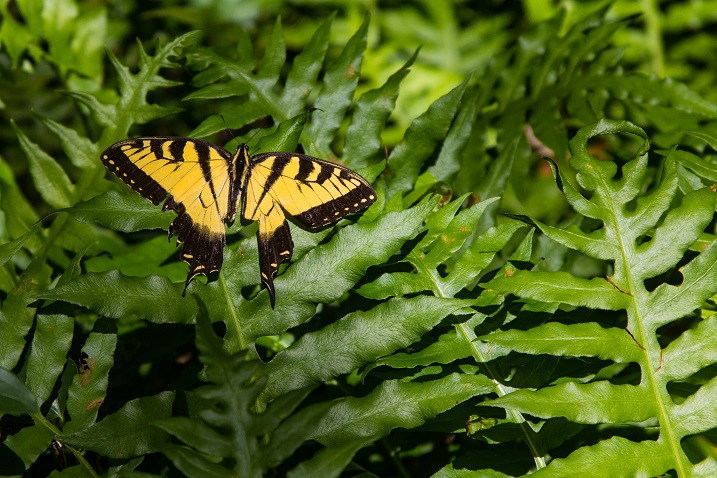
CRESWELL — Tucked away from the traffic, Pettigrew State Park’s charm is found in its unique combination of scenery, wildlife and history.

A main feature of the park is Lake Phelps, which is the state’s second-largest natural lake, and a rarity for eastern North Carolina: It’s not stream-fed. As a large rainwater collection, Lake Phelps is thus among the state’s cleanest lakes, according to the park website.
Supporter Spotlight
The lake measures 7 miles east to west and 5 miles north to south, with a circumference of 21 miles, according to Charlotte Davis, a Pettigrew park ranger. “Despite the size of it, it’s pretty shallow,” Davis said, noting the average depth is 4.5 feet and the deepest section is 9 feet.
The park is 5,830 acres, said Jim Trostle, another park ranger, not including the 16,600-acre lake. The main park land is by the lake, but separate sections of property are along the Scuppernong River and outside of Columbia. “We’re very spread out,” Trostle said.
Visitors have sometimes expressed surprise that there are no alligators in Lake Phelps, but despite its many boaters and swimmers, the park has never received an alligator sighting report.

“Most of the time, our lake’s really clear, when it’s not white-capping,” Davis said. This does not create plausible “ambush” conditions for alligators.
Park visitors may very well encounter bears, however, which is news to many of them.
Supporter Spotlight
“For some reason, people are surprised there are bear here,” Trostle noted. “They always think of them being in the mountains.” He sees them “almost daily.”
Davis said it makes sense the bear population is significant at Pettigrew. “There are nuts and berries in the woods, fish in the lake (and) crops in the fields,” she said. “People come from everywhere to hunt bear” in land surrounding the park – no hunting is allowed on park grounds.
Time and land use are believed to have shifted the lake’s location.
“We think the lake might be moving slowly westward,” Trostle said. “In part, that may be storm-driven.”
From looking at maps of the lake’s coastline dating back 150 years, “we know it’s shifted,” Trostle said. Staff observations also lead them to believe the lake is slowly moving: “Part of the trail that’s usually not flooded had water on it for months,” he said.
Human activities also contribute to changes, Davis stated.
“Over the years, the use of the land has changed,” she said. “All this used to be swamp. The early settlers called it the ‘Haunt of Beasts.’”
Before much of the land was converted into farmland for plantations, the swamp, dense vegetation and bountiful bugs kept early settlers away.
But the bane of some people’s existence is the subject of scientific research now.
Trostle said a group from Old Dominion University in Virginia is conducting a study in the park on climate change effects, as measured by Gulf Coast ticks: “To see if their range is expanding.”
Algonquin Artifacts
Unlike newly arrived Europeans, Native Americans frequented the lake and surrounding forests for seasonal hunting and fishing. Algonquin artifacts spanning 11,000 years have been found in the area, with some dated back to as early as 8,000 B.C.E., according to the park website.
A wildfire in the mid-1980s was fought with water from Lake Phelps, which took the water level down to as low as 1 foot in places, according to Christy Maready, park administrative associate.
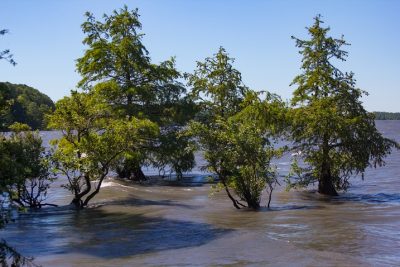
“Artifacts became visible — clay pots and canoes,” Maready said.
Thirty Algonquin dugout canoes, including some whole canoes and some parts, were found, and about 13 were removed, she said. The largest canoe, measuring 36 feet, is now housed in the North Carolina Museum of History in Raleigh. The oldest was carbon-dated back 4,000 years. Native Americans sunk their canoes in between seasons.
“They would purposely sink them, as a way of preserving them,” Trostle said of the canoes. “They don’t get bugs in them either (underwater). They didn’t have a way to haul them.”
Two of the cypress canoes were displayed at Pettigrew State Park when Davis, 35, was young, she recalled. They are currently at an East Carolina University lab being restored, and once Pettigrew receives a visitor center, the hope is to bring them back, she said.

This fall will mark the Pettigrew’s 32nd annual Indian Heritage Week. Area schoolchildren —usually fourth-graders — come learn about the lifestyle of the area’s original residents and help work on burning and scraping out the inside of a replica canoe another park ranger crafted, Davis said.
The park headquarters showcases a variety of Algonquin artifacts, including fishhooks and projectile points, such as those used for spears.
Trostle turned a stone ax head over in his hands. “This was probably a week’s worth of work,” he said, explaining how the Native Americans repeatedly chipped little pieces off the stone then sanded it smooth. A display case also features reproduction clay cooking pots and a mortar and pestle set, among other artifacts and informational displays.
Also in the room with the artifacts are stuffed species of mostly local origins — everything from bears to tundra swans to nutria. An elk hails from the western part of the state, and a boar came from Johnson County. Just one animal remains a point of contention.
“People say they’ve seen them (here),” Davis said, referencing a stuffed mountain lion. “I’m open minded. I have a lot of family who are farmers; but they’ve seen something.”
“I’ll believe it when I see it on a trail cam,” Trostle quipped, citing the lack of photographic evidence.
Wind, Waves & Recreation
Lake Phelps is wind driven. Winter generally brings a north wind.
“A north wind means the south side of the lake is rough, (but) we’re fine,” Davis said. Summer often heralds a south wind, where the tables turn, and the lake by park headquarters is choppy.
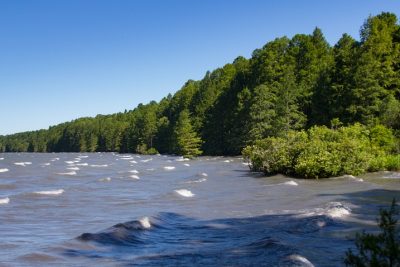
A public canoe trip on Lake Phelps scheduled for June 21 was cancelled because of waves of 1-2 feet. “Today’s the first day of summer, and it’s a south wind,” Trostle noted, laughing about the wind switching that morning exactly.
Park staff schedule at least one public canoe trip every month during the summer. Canoe the Scuppernong, slated for June 8, was cancelled due to thunderstorms. The next venture, also on the Scuppernong River, is set for July 19. The park hopes to eventually have a system to be able to rent out its eight, two-seater canoes, Davis said.
Spring and fall are the busiest seasons at Pettigrew, with visitors hiking, paddleboarding, kayaking, boating, fishing and camping.
“Last summer a lady paddleboarded almost the entire circuit of the lake — 21 miles,” Davis said.
“We’re a trophy bass lake,” Davis added. Fishermen are limited to keeping five bass, but bass must be thrown back if they’re smaller than 14 inches or larger than 21 inches, she explained. Fishermen also regularly catch yellow perch, bream and catfish.
Many people take advantage of the park as an economically friendly way to visit the beach. A $28 campsite easily beats a $250 hotel room on the Outer Banks, Davis said. “Instead of going to the beach and spending lots of money, they stay the night (here), go to the beach and come back for the night.” These visitors come from all over the state, but also from other countries, Davis said, naming Canada, Switzerland, Germany and Australia.
Pettigrew State Park has 13 regular campsites and a group camp that can accommodate 30-35 people. Scouting, church and family groups often use that camp, Davis said.
“Astronomy is big here,” Trostle noted. “Some of the darkest skies in Eastern North Carolina are here — there’s not a lot of light pollution.”
A Rocky Mount-based astronomy club frequents Pettigrew, offering free, informal programs for visitors.
“They’ll bring their huge telescope and tell people about what they’re looking at in the sky,” Trostle said. This year, one such event was planned for April, and one is being organized for the fall.
Summertime brings visitors as well, “but there comes a point in time when it just gets too muggy,” Davis said.
Winter brings the birders.
Tundra swans take refuge for the winter in the many lakes in eastern North Carolina, including Lake Phelps, Pungo Lake and Lake Mattamuskeet, Davis said. They generally show up in late November or early December and stay until February. Last year, 28,778 tundra swans were seen in a 15-mile radius. “Some years it’s been in the 35,000 range,” Davis said.
Tundra swans are joined by snow geese, which numbered 34,435 last year, and a variety of ducks. The tranquility of the lake can morph into cacophony at times.
“Especially when they’re flying right on top of you, they can get very vocal,” Davis said. “During the winter, people are amazed at how much waterfowl we have.”
Symbiotic Relationship
The park enjoys a symbiotic relationship with Somerset Place, a former plantation that the North Carolina Department of Natural and Cultural Resources maintains as a State Historic Site. Somerset Place is located within Pettigrew’s boundaries, and is a hike of only a few minutes from the park headquarters down a quarter-mile wooded boardwalk trail that skirts the lake. Park employees built the boardwalk themselves rather than contracting it out. “it was a labor of love,” Davis said.
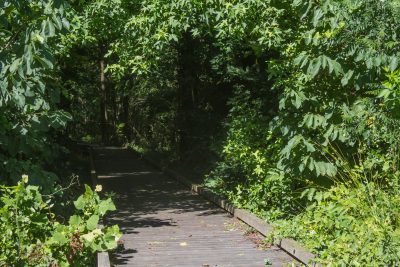
Some people are drawn to take the free tours exploring how life was on a 19th century plantation and end up visiting the park as well, while others start at the park and end up at Somerset, Davis said.
Pettigrew State Park is named after James Johnston Pettigrew, a Civil War Confederate general whose plantation was next to Somerset, Maready said. The Pettigrew Family Cemetery can be reached by hiking a roughly mile-long trail from the park’s headquarters.
Two other state parks receiving similar numbers of visitors as Pettigrew each year: Weymouth Woods Sandhills Nature Preserve in Southern Pines, with 67,000 visitors, and Mayo River State Park in Rockingham County, which sees 74,000, Davis said.
Interested large groups of visitors can request use of the state’s two big canoes, which are 29 feet long and hold up to 14 people each. The state parks share these and send them as available based on advance scheduling. School groups, scouting groups and 4-H camps in nearby counties regularly schedule these canoes at Pettigrew, Davis said.
Park programs are free, weather-dependent and require advance registration. Park headquarters is located at 2252 Lake Shore Road in Creswell. The office number is 252-797-4475.




